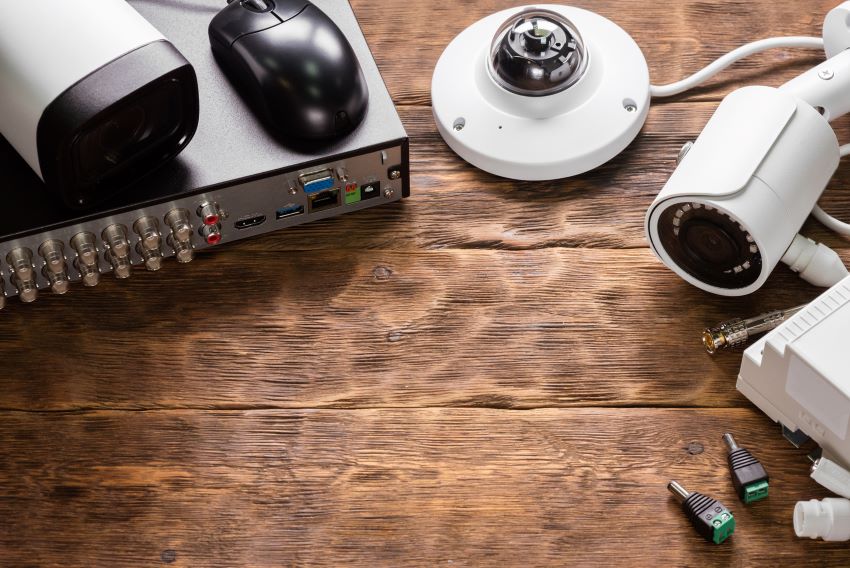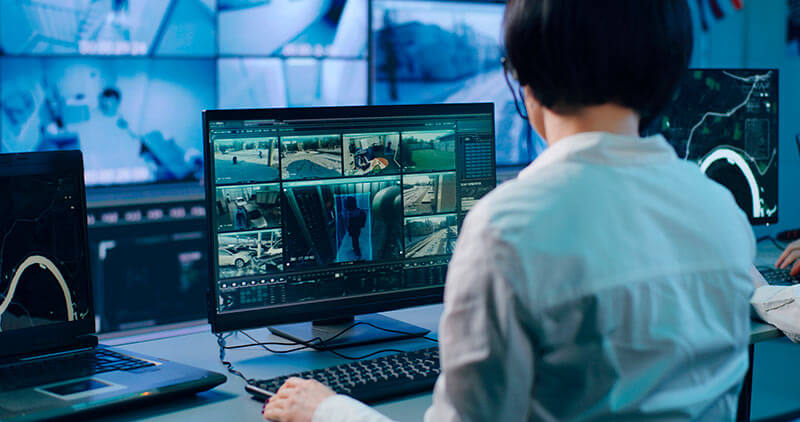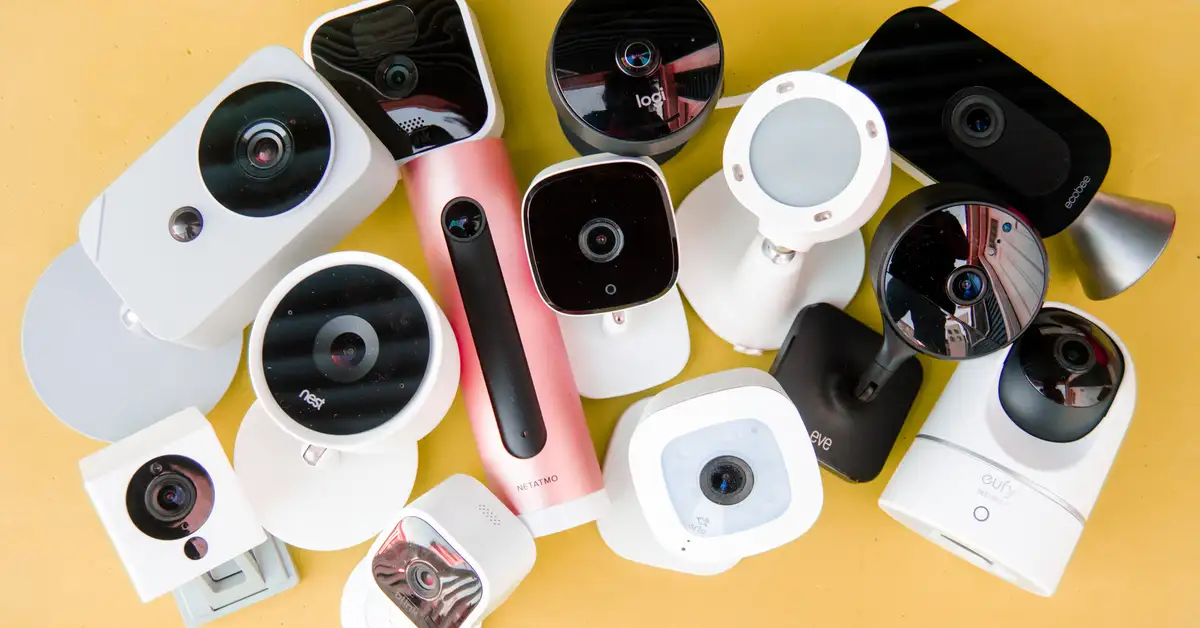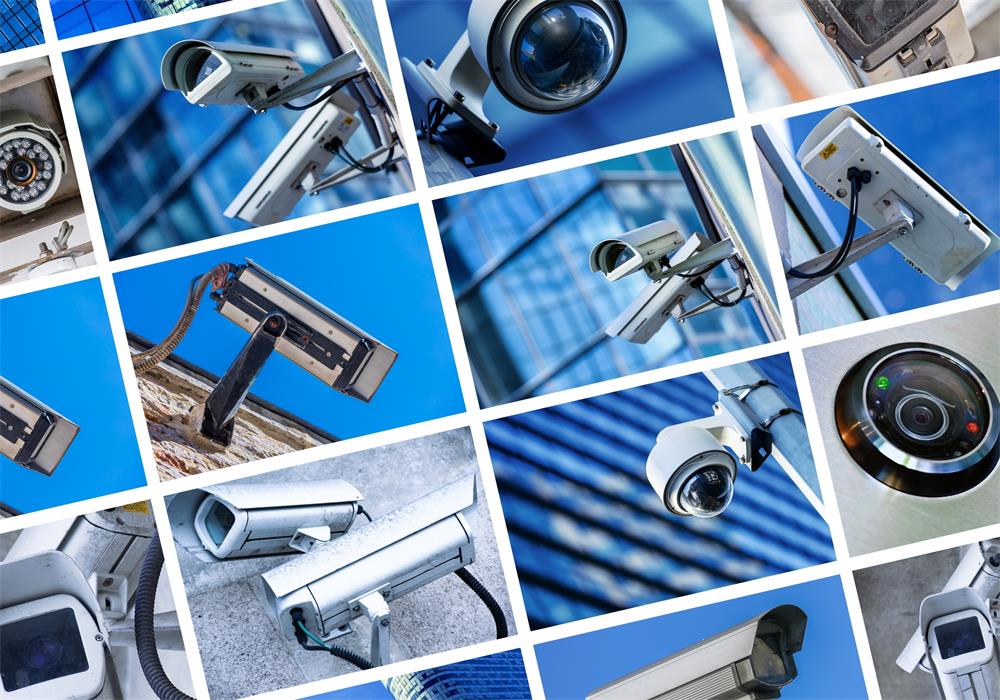Contents
The Importance of Security Cameras and Overview of Different Types
Security cameras have become a common sight in modern society. They are used in businesses, homes, and public places to deter crime, monitor activity, and provide evidence in case of a security breach. It’s no secret that they play an important role in maintaining the safety of people and property.
In this article, we will discuss the various types of security cameras available on the market. There are wired and wireless cameras, night vision cameras, IP cameras, and hidden or discreet cameras.
Each type has its pros and cons depending on your specific needs. Wired security cameras are a common choice for those who prioritize reliability and high-quality video footage.
They require an Ethernet or coaxial cable to transmit footage to a recording device or monitor. Although wired systems can be expensive, they offer high-quality video with little interference from other devices.
Wireless security cameras do not require cables for transmission but instead use Wi-Fi or Bluetooth to transmit data to a recording device or cloud storage service. These types of systems are easy to install and offer flexibility in placement options.
They also tend to be more affordable than their wired counterparts. However, wireless systems have their drawbacks such as potential signal interference or hacking threats that may compromise their security.
When it comes to IP (Internet Protocol) security cameras – these use Ethernet cables or Wi-Fi connections for remote access over the internet. This means you can view live footage from your smartphone while away from home or office – which is great for monitoring pets or children when you’re not around!
However, these types of systems require strong internet connections for optimal performance. Night vision security cameras use infrared technology (IR) which allows them to capture clear footage even in low-light conditions making them ideal for outdoor surveillance at night time!
However, they may fail to work well when it’s pitch black outside like during a power outage. Hidden or discreet cameras offer a covert method of surveillance and can be used for both home and business purposes.
They are often designed to blend in with their surroundings or be disguised as other objects like a book or a clock. However, it’s important to check the legality of using hidden cameras before installing them.
Security cameras play a vital role in maintaining safety and preventing crime. Now that you have an overview of the different types available on the market, it’s time to determine which one fits your needs best!
Wired Security Cameras
The Definition and Explanation of Wired Security Cameras
Wired security cameras are surveillance cameras that are physically connected to a recording device, such as a digital video recorder (DVR) or network video recorder (NVR). These cameras use cables to transmit footage from the camera to the recording device. The cables can be either coaxial or Ethernet cables.
Wired security cameras are often used for large commercial or industrial spaces where extensive coverage is required. They can also be used for residential properties, but their installation may be more complicated compared to wireless options.
The Pros of Wired Security Cameras
One of the main advantages of wired security cameras is their reliability. Since they are physically connected to a recording device, there is no need to rely on Wi-Fi or cellular signal for transmission.
This means that the risk of losing footage due to connectivity issues is eliminated. Another advantage of wired security cameras is their high-quality video output.
Unlike wireless options, wired cameras do not have limitations caused by signal interference from other devices such as microwaves or mobile phones. Additionally, since wired security cameras do not rely on wireless networks, they offer greater privacy and protection against hacking attempts.
The Cons of Wired Security Cameras
The installation process for wired security cameras can be difficult and time-consuming since it requires running cables through walls and ceilings. It may also require professional installation services which can add an additional cost. Wired security cameras also have limited mobility due to being physically connected and therefore cannot be easily moved once installed without rerunning wires.
They can be expensive compared to other types of security cameras due to the cost associated with cabling materials and professional installation services. Overall, while wired security cameras may offer superior video quality and reliability over other types, they may not always be the best choice depending on specific needs and budget constraints.
Wireless Security Cameras
Unrestricted and Versatile Surveillance
Wireless security cameras are an increasingly popular choice for home and business surveillance due to their flexibility and easy installation. Unlike wired cameras, they don’t require drilling or concealing wires, so they can be placed virtually anywhere that has a power source.
This means you can monitor your property without the stress of damaging walls or floors. Installation is simple.
Once the camera is mounted, connect it to your Wi-Fi network via an app on your smartphone or tablet. This allows you to access live footage from anywhere at any time, as long as there’s an internet connection.
Pros of Wireless Security Cameras
One major advantage of wireless cameras is their affordability in comparison to wired cameras. In addition, wireless security cameras offer remote monitoring through mobile devices with apps that are often free of charge.
And since the camera operates wirelessly, there’s no need for any additional wiring or peripherals. Another benefit of wireless security cameras is their versatility with regards to placement options.
With fewer limitations than wired cameras, these kinds of units allow installation on doors/windowsills/entranceways/balconies/rooftops/nearby trees or bushes/corners in rooms/hallways/etc., etc. When it comes to accessibility management features like motion detection alerts based on which aspects of a room may register motion patterns relevant to human activity such as door opening/closing/dogs barking/movement within space – wireless models give you all the same features but also include options for facial recognition,” making them ideal candidates not just for residential use but business/office/workplace monitoring applications too!
Cons of Wireless Security Cameras
The main downside is potential signal interference which can cause blurry video quality or even loss of connectivity between the camera and monitoring device. Additionally, surveillance footage taken by wireless cameras can be susceptible to hacking, which can put your private data at risk.
Wireless cameras are known for producing videos with lower resolution than wired cameras. The video quality depends on the camera’s specifications and the strength of your Wi-Fi signal, so it’s important to choose a reliable model and make sure that it’s placed within optimal range of your Wi-Fi router.
While wireless security cameras offer many advantages over their wired counterparts, they do come with some potential drawbacks too. It’s important to carefully consider all the options before deciding which type of camera is best suited for your needs – especially if you’re looking for long-term surveillance protection or high-quality footage capture!
IP Security Cameras: High-Quality Surveillance with Remote Access
IP security cameras, also known as network cameras, are a type of digital video camera that can send and receive data through a computer network or the internet. These cameras are becoming increasingly popular because they offer high-quality video resolution and remote access and control through an internet connection.
The main advantage of IP security cameras is their high-resolution video quality. Unlike analog CCTV cameras, which typically provide fuzzy, low-quality images, IP cameras capture video at resolutions up to 4K Ultra HD.
This means that you can see details more clearly, making it easier to identify people or objects in the footage. Another advantage of IP security cameras is their ability to be accessed remotely.
Since these cameras connect to your network or the internet, you can view your camera feeds from anywhere with an internet connection. This makes it easy to keep an eye on your property when you’re away from home or monitor your business from another location.
Additionally, many IP security cameras come with software that allows you to control and manage your camera feeds remotely. You can adjust settings like motion detection sensitivity and recording schedules without having to physically interact with the camera itself.
Cons: The Need for Strong Internet Connection
One potential disadvantage of IP security cameras is that they require a strong internet connection for optimal performance. If your internet connection is slow or unreliable, this can result in laggy video playback or difficulty accessing your camera feeds remotely.
In addition, if you have multiple IP cameras installed on the same network, this can put a heavy strain on your internet bandwidth and slow down other devices connected to the same network. To combat these issues, some users opt for a wired connection instead of relying solely on Wi-Fi connectivity.
By connecting their IP cameras to the router via an Ethernet cable, they can ensure a reliable and consistent connection. Overall, while IP security cameras have some potential drawbacks, the benefits they offer in terms of high-quality video and remote access make them a popular choice for home and business surveillance.
The Eyes That See in the Dark: Night Vision Security Cameras
Security cameras have become an essential part of our lives, helping us to monitor our surroundings and providing evidence when needed. However, when it comes to low-light conditions or dark environments, regular cameras might not be enough. This is where night vision security cameras come in.
These specialized cameras are designed to capture clear footage even in low light conditions and complete darkness. Night vision security cameras use infrared technology to see in the dark.
Infrared light is not visible to the human eye but can be detected by special sensors on the camera. When there is not enough light for a regular camera to capture a clear image, night vision security cameras switch on their infrared sensors and illuminate the area with infrared light, allowing them to capture footage.
The biggest advantage of night vision security cameras is their ability to provide clear and detailed footage even in low-light conditions. This makes them particularly useful for areas that are poorly lit or for outdoor surveillance during nighttime hours.
They can also be used indoors where lighting might not be sufficient for regular cameras. However, it is important to note that night vision security cameras may not work well in complete darkness as they still rely on some ambient light to function properly.
In addition, some models may produce a grainy or monochrome image during nighttime recording due to limitations of infrared technology. It’s always best to test your camera’s performance before relying on it completely.
If you need surveillance coverage during nighttime hours, then investing in a good quality night vision security camera is a must-have solution for your safety needs. With its ability to capture clear footage even when lighting conditions are poor or non-existent, these types of security cameras offer peace of mind knowing that your property or loved ones are being monitored around-the-clock at all times.
Hidden/Discreet Security Cameras
When we think of security cameras, we often picture bulky, obvious devices that are hard to miss.
However, hidden or discreet security cameras offer a different approach that could be more suitable for some situations. Hidden or discrete security cameras are designed to blend in with their surroundings and remain unnoticed.
They can be disguised as everyday objects like clocks, smoke detectors or even potted plants. This type of camera is ideal for those who want to monitor their surroundings without drawing attention to themselves.
The Pros of Hidden/Discreet Security Cameras:
The primary advantage of hidden/discreet security cameras is their ability to blend in with the environment. With this feature, these cameras can capture footage without raising any suspicions from the people being monitored.
For instance, if you’re trying to catch a fraudster at work, they might be more guarded if they know they’re being watched by an obvious camera. In addition, covert surveillance may be necessary in situations where ordinary surveillance would not fit in well with the surroundings.
For example, if you want to keep an eye on your nanny’s behavior towards your children while you’re not around – without making her feel uncomfortable – then a hidden camera would come in handy. Hidden/discreet cameras often offer additional features such as motion detection and night vision which make them even more effective at monitoring your premises without drawing attention.
The Cons of Hidden/Discreet Security Cameras:
A major issue with deploying hidden/discreet security cameras is their legality – it may not be legal in many areas or situations. In some states and countries, laws prohibit the use of hidden surveillance devices that record video or audio without the consent of all parties involved.
It is important to research and understand the laws in your jurisdiction before deploying any kind of security camera. In addition, using hidden/discreet cameras may also violate ethical considerations.
For example, if you’re monitoring your employees without their knowledge during work hours, this could be seen as an invasion of privacy. Employees may feel uncomfortable knowing that they are being watched without their knowledge or consent.
Another disadvantage of hidden/discreet cameras is their cost. They can be significantly more expensive than other types of security cameras because they often come with additional features and higher-quality hardware required to maintain their covert status.
Conclusion
Security cameras have become an essential tool for many people who want to keep an eye on their properties or loved ones. However, choosing the right type of camera can be challenging given the many options available in the market today.
If you are considering installing a security camera system on your property, it’s important to weigh the pros and cons carefully before making a decision. While each type has its advantages and disadvantages, understanding what each option offers will help you make an informed choice that meets your needs and budget.
Conclusion In today’s world, security cameras have become an essential tool for many businesses and homeowners. With so many options available, choosing the right type of camera can be a daunting task.
Wired cameras are reliable and provide high-quality video, but they come with a high price tag and are difficult to install. Wireless cameras are easy to install and more affordable, but their video quality may not be as good as wired cameras.
IP cameras offer remote access through an internet connection, but require a strong internet connection for optimal performance. Night vision security cameras can capture clear footage in low-light conditions, making them ideal for outdoor surveillance.
However, they may not work well in complete darkness. Hidden or discreet cameras can blend in with their surroundings for covert surveillance purposes, but it’s important to note that they may not be legal in all areas or situations.
Each type of security camera has its own set of pros and cons that must be carefully considered before making a decision on which one to purchase. It’s important to assess your specific needs and budget before deciding on which type of camera to invest in.
At the end of the day, having proper security measures in place is crucial for your safety and peace of mind. With advancements in technology continually improving the capabilities of security systems, there is no doubt that we will continue to see even better options emerge over time.
Remember: investing in the right security camera system can make all the difference when it comes to preventing crime or ensuring justice is served if something does happen. So don’t hesitate – do your research today!











